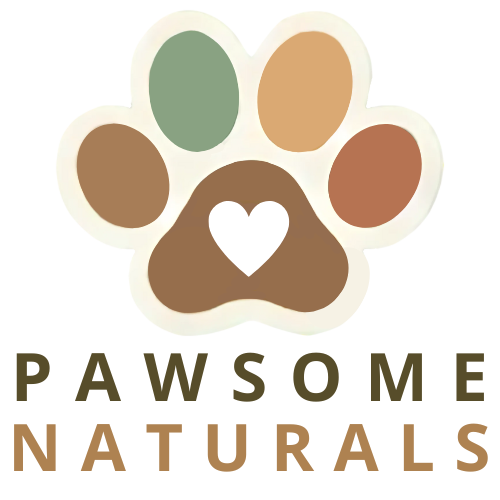FAQs
Are your products Australian made?
Yes, Pawsome Naturals is proudly Australian-owned, and our products are made in Australia using high-quality, carefully sourced ingredients.
Where can I buy your products?
You can purchase our products directly through the Pawsome Naturals website.
What are complementary medicines for pets?
Complementary pet medicines are natural supplements and remedies that support pets' overall health and well-being. Some ingredients in Pawsome Naturals products have been used for centuries in traditional medicine, while others are backed by modern scientific research. These formulations can contain vitamins, minerals, herbs, and other natural compounds to promote vitality and balance in your pet's health.
How do complementary medicines differ from conventional pet medications?
Vets typically prescribe conventional pet medications to treat specific illnesses, infections, or chronic conditions. In contrast, complementary medicines work alongside traditional veterinary care to support overall health, help manage minor ailments, and promote wellness naturally.
Are complementary medicines safe for dogs and cats?
Our high-quality complementary medicines are formulated specifically for pets and are generally safe and well-tolerated when used as directed. However, it's always best to consult your vet before introducing new supplements, especially if your pet has an existing medical condition or is on a prescription medication.
What types of health concerns can complementary medicines support?
Complementary pet medicines may assist with the following:
- Joint and mobility support
- Skin and coat health
- Gut and digestive health
- Stress and anxiety management
- Immune system support
- General vitality and wellness
How do I know which complementary medicine is right for my pet?
Choosing the right supplement depends on your pet's needs and health goals. Our website provides detailed product descriptions and recommendations to help guide you. If you're unsure, consult your veterinarian for tailored advice.
How should I give complementary medicines to my pet?
Our products are available in various easy-to-administer formats, such as powders and liquids. Most can be mixed into your pet's food or given directly. Refer to the individual product instructions for the recommended method of administration.
How long does it take to see results from complementary medicines?
The timeframe for results varies depending on the supplement and your pet's specific health condition. Some pets may experience benefits within days, while others may require consistent use over several weeks to achieve optimal results.
Can complementary medicines be used alongside conventional veterinary treatments?
In many cases, complementary medicines can be used in conjunction with conventional treatments. However, always check with your vet to ensure there are no potential interactions with your pet's current medications or health conditions.
Does scientific research back your complementary medicines?
Yes! At Pawsome Naturals, we formulate our products based on scientific research and evidence-based practices. We prioritise quality, safety, and efficacy to ensure the best possible support for your pet's health.
Do you offer any guarantees or refunds?
We stand behind the quality and effectiveness of our products. If you're not completely satisfied with your purchase, please get in touch with us, and we'll be happy to assist you with returns, refunds, or exchanges according to our satisfaction guarantee policy.
Are Pawsome Naturals products suitable for all breeds and ages?
Our complementary medicines are designed to support dogs of all breeds and life stages. However, some formulations are tailored explicitly for puppies, seniors, or dogs with particular health concerns, so be sure to check product details for the best fit.
Where can I buy Pawsome Naturals products?
You can purchase our products directly from our website and through selected pet retailers across Australia. Check our shop page for more details.
If you have any other questions, feel free to contact our team - we're here to help you make the best choices for your pet's health and happiness!
